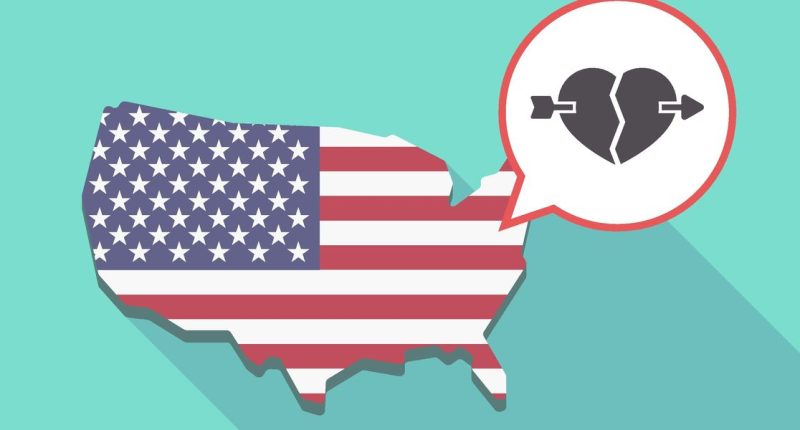
Recently, I appeared on âThe Culture Warâ with Tim Pool, discussing the possibility of national divorce with Louis Marinelli, founder of the CalExit campaign, a movement to establish âthe country of Pacifica in the San Francisco Bay area.â Three weeks ago, Daniel Miller, leader of the Texit movement, was on the show discussing the possibility of Texas leaving the Union. At LibertyCon earlier this month, Mises Institute editor Ryan McMaken and Project Liberal founder Jonathan Casey debated whether a national divorce would lead to more liberty.
Why is national divorce such a hot topic these days? Could it be because 65% of Americans believe candidates for office serve âtheir own interestsâ and 61% percent believe those interests are for the wealthy?
We must give power to the powerless and representation to the unrepresented.
The reason so many Americans want a national divorce is that they feel unrepresented and powerless.
But we tried a national divorce before. It didnât work out.
The three-fifths compromise determined representatives and direct taxes apportioned by the whole number of free persons and three-fifths of all other persons, meaning slaves. This meant that Southern slaveholding states would have unequal representation in the House. They could purchase representation and increase their power in the House of Representatives and the Electoral College.
The founding generation set forth a path to abolish slavery with the Northwest Ordinance of 1787, the Act Prohibiting Importation of Slaves of 1807, and the Missouri Compromise of 1820. Unfortunately, the foundersâ heirs failed to follow through with the plan. Slaveholders consolidated the power of the executive, Senate, and House into the well-funded and organized Democratic Party to preserve and extend slavery.
The power shift began with the annexation of Texas and continued with the Mexican-American War and the Kansas-Nebraska Act. The Democratic Party maneuvered and consolidated power to advance the cause of slavery, undoing the founding generationsâ work. Consolidating power also caused a divide in the Union that went deeper than slavery.
Fighting for voting rights
In the period leading up to the Civil War, a majority of Americans did not support the abolition of slavery. What they did agree on was that Southern slaveholders had manipulated power that created economic instability and sent the nation to war with Mexico. Innocent Americans were dying, and it was all in pursuit of the preservation of slavery.
To defeat the power of the slaveholders who controlled the Democratic Party, the other factions of power consolidated into the new Republican Party. The slaveholders were in the majority power position for a long time, and they didnât want to give it up. When they became the minority, they left the Union, leading to the Civil War.
Over time, the Northerners understood that the real fight was over representation. Americans were reminded of the declaration that âall men are created equal.â And to be equal, each man must be given a vote. To be free, a person must have a voice in his government â a right to representation.
The Civil War led to the 13th, 14th, and 15th Amendments, which freed the slaves, extended the federal governmentâs protection over the people of the states, and balanced representation in the House by expanding the right to vote.
Red vs. Blue
What does our past national divorce have to do with the current discussion about national divorce?
During the Gilded Age and Progressive Era, immigration grew substantially in America. This led to a new fight over representation in the House. Representatives of cities supported counting all persons for purposes of apportionment in the House. Representatives of rural America wanted to count only American citizens. By 1911, this caused a stalemate in Congress over apportionment that lasted until 1929 with the Permanent Apportionment Act, which capped the number of representatives at 435 and determined that apportionment would count all persons regardless of citizenship or legal status.
Since 1929, the representative-to-citizen ratio has grown from 1 to 220,000 to around 1 to 756,000. Power has concentrated in cities, leading to an imbalance of power in the House between rural and urban America. Americans canât divorce because they are not divided by statesâ interests. The lines are blurred. Itâs not North versus South or this state versus that state. Itâs the interests of red versus blue.
The capping of the House has concentrated power in those with connections and money to donate. The representative speaks with donors and insiders instead of the American people. The rest of America, people with busy family schedules and bills to pay, are left powerless and unrepresented.
The idea of popular sovereignty led to the violence of Bleeding Kansas. If we were to adopt that idea again, like allowing a state to leave the Union, there is a likelihood of violence that could escalate into another civil war. In the event of a state leaving the Union, what would happen if the blue part of California began oppressing the red part or, in Texas, the red part began oppressing the blue part? What if it led to violence like in Bleeding Kansas? Would the federal government step in if innocent Americans caught in the middle were dying?
Uncap the House
A national divorce carries the possibility of violence, and itâs powerless, unrepresented American citizens who would suffer the most.
In Federalist 10, James Madison argued that factions are natural in society, and to control the effects of factions, we must create a system that recognizes and harnesses its power. In Federalist 55, Madison argued the virtues and flaws of the small and large legislative bodies. A large body can be confusing and inefficient, and a small body is more efficient but is at a higher risk of corruption.
National divorce is not the answer â but representation is. We need a larger legislative body to limit government corruption while allowing more factions to balance our diverse society. We must give power to the powerless and representation to the unrepresented. We must uncap the House of Representatives.
Also Read More: World News | Entertainment News | Celebrity News







